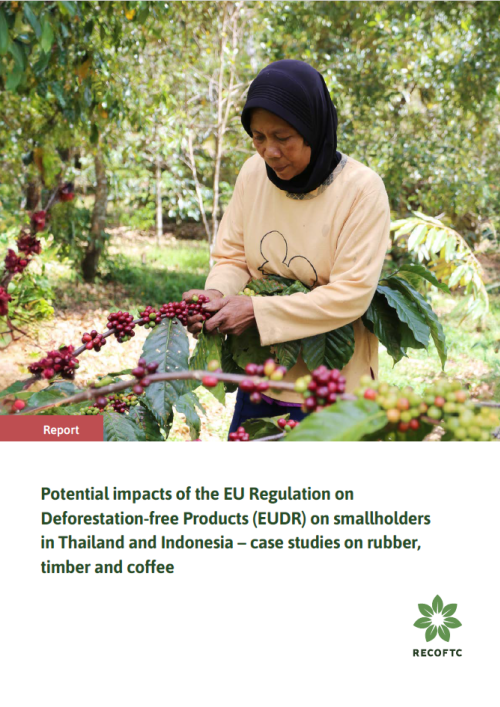APA 6th ed. Potential impacts of the EU Regulation on Deforestation-free Products (EUDR) on smallholders in Thailand and Indonesia – case studies on rubber, timber and coffee. (2024, June 21). Retrieved from https://www.recoftc.org/publications/0000469
MLA 8th ed. Potential impacts of the EU Regulation on Deforestation-free Products (EUDR) on smallholders in Thailand and Indonesia – case studies on rubber, timber and coffee. RECOFTC, 21 June 2024, https://www.recoftc.org/publications/0000469.
Chicago 17th ed. RECOFTC. 2024. "Potential impacts of the EU Regulation on Deforestation-free Products (EUDR) on smallholders in Thailand and Indonesia – case studies on rubber, timber and coffee." Published June 21, 2024. https://www.recoftc.org/publications/0000469.
Potential impacts of the EU Regulation on Deforestation-free Products (EUDR) on smallholders in Thailand and Indonesia – case studies on rubber, timber and coffee

The European Union (EU) Regulation on Deforestation-free Products (EUDR) aims at reducing the EU’s contribution to global deforestation and calls for the consumption and trade of 'deforestation-free' products.
It puts a ban on the sale of rubber, timber, coffee, soya, cattle, palm oil and cocoa commodities and some of their derived products, where companies cannot prove these did not come from deforested land. Across the forest landscapes of Southeast Asia, providing this proof is not always a simple or straightforward task. As such, even as the EUDR aims to promote sustainability in trade, it could pose potential challenges for smallholders in practice.
Widescale implementation of the EUDR will likely affect communities that are already dealing with climate change impacts and facing difficulties securing their land rights and ensuring the quality and quantity of their products.
To assess these and other potential impacts, RECOFTC conducted field research amongst rubber smallholders in Thailand and coffee and timber smallholders in Indonesia. These studies sought to gauge the awareness levels of smallholders and other stakeholders concerning the EUDR and identify what support they may need to comply with this and similar regulations in the future. The results are presented in the form of three case studies compiled in this report.

